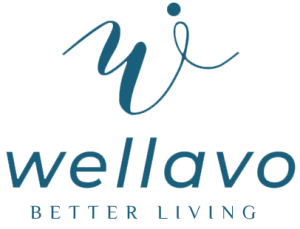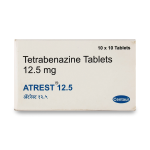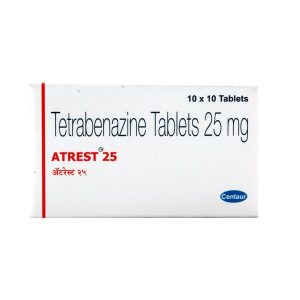Description
INTRODUCTION
ATRANZA 10MG contains Tretinoin which belongs to the group of medicines called retinoids. It is used to treat a type of blood disorder called as acute promyelocytic leukemia (APL). APL is form of acute myeloid leukemia (bone marrow cancer), in which the immature blood-forming cells (RBC, WBC and platelets) called promyelocytes accumulates in the bone marrow and blood, leading to shortage of normal white and red blood cells and platelets in the body.
Shortage of blood-forming cells in the blood leads to symptoms such as abnormal bleeding and bruising, blood clots, excessive tiredness, pale skin, pain in affected areas, loss of appetite and weight loss. Tretinoin reduces the growth of diseased blood cells by inducing initial maturation and proliferation of the immature promyelocytes accumulated in the bone marrow.
This medicine can be taken preferably with a meal or shortly thereafter. Your doctor will decide the correct dose and duration for you depending upon your age, body weight and health condition. The most common side effects of taking this medicine are headache, nausea, vomiting, skin rash, stomach pain and fever. Contact your doctor if any of the symptom bothers you.
ATRANZA 10MG should be used with caution in patients who have ever had any mental problems like depression or mood changes in the past, as tretinoin could aggravate them. Before taking this medicine, inform your doctor if you are pregnant or you think you are pregnant, because tretinoin can cause harm to your unborn baby. Your doctor will suggest a suitable method for contraception. Also, you should not get pregnant during or within 1 month after stopping treatment with tretinoin. Tretinoin can pass through breast milk, and therefore should not be used in lactating mothers.
USES OF ATRANZA 10MG
- Treats acute promyelocytic leukemia
HOW ATRANZA 10MG WORKS
Tretinoin taken orally, binds to the alpha- and beta- retinoic acid receptors, that are associated with the development of acute promyelocytic leukemia. It produces an initial maturation of the immature promyelocytes derived from the leukemic clone and induces cellular proliferation of the matured and healthy blood-forming cells (RBC, WBC and platelets) in the bone marrow, thereby, reducing the symptoms of APL such as abnormal bleeding, tiredness and weight loss.
DIRECTIONS FOR USE
Take this medicine as directed by your physician. It can be taken preferably with a meal or shortly thereafter. Swallow the medicine as whole with a sip of water. Do not crush or chew the medicine. Your doctor will decide the correct dose and duration for you depending upon your age, body weight and health condition. Continue to take this medicine, as long as your doctor tells you to do so, to obtain better results.
SIDE EFFECTS OF ATRANZA 10MG
SERIOUS
- Signs of Sweet’s syndrome (fever with dark lumpy markings on your skin, most likely on your face and neck)
- Signs of a blood clot (painful swelling in your leg, sudden chest pain or difficulty in breathing)
- Sign of a heart attack (a pain in chest that spreads to your arm or neck)
- Sign of pancreatitis (severe stomach pain that spreads to your back)
- Sign of increased intracranial pressure (such as double vision, feeling dizzy, especially with feeling or being sick, ringing in your ears and headache)
- Sign of a stroke (such as an unexplained headache or migraine, which can include disturbed vision)
- Fever with breathing difficulties, coughing
- Severe headache
- Chest or back pain
COMMON
- Hair loss
- An irregular heartbeat
- Changes in your eyesight or hearing
- Joint pain, chest pain or abdominal pain
- Skin rash, redness, itching, peeling or inflammation
- Dry skin, mouth or nose
- Breathing difficulties such as asthma
- Conjunctivitis or dry eyes
- Difficulty in sleeping
- Excessive sweating
- Headache or feeling dizzy
- Feeling tired or cold
- Feeling confused, worried or depressed
- Numbness of your hands or feet
- Loss of appetite, nausea, vomiting, stomach upset, stomach pain
- Diarrhea or constipation
HOW TO MANAGE SIDE EFFECTS
Nausea and vomiting:
Try taking this medicine with, or just after meals. Stick to simple meals. Do not eat rich or spicy food.
Constipation:
Eat fibre rich foods like fresh fruit, vegetables and cereals. Drink plenty of water. Exercise more regularly.
Diarrhea:
Drink lots of fluids, such as water or juice, to avoid dehydration. Do not take any medicines without speaking to a doctor.
Stomach pain:
Try to rest and relax. You can eat and drink slowly or have smaller and frequent meals. Keeping a heat pad on your stomach may also help. If still pain persists, speak to your doctor.
Skin rash:
Avoid hot showers because hot water can irritate the skin. Do not rub or scratch the affected area. Use sunscreen and protective clothing when outdoors. Regularly use moisturizers to soothe and hydrate the affected area. If it does not get better, speak to a doctor.
Loss of appetite:
Eat when you are hungry. Try to eat smaller meals more often than usual. Snack only when you’re hungry. Always try to have a nutritious snack that is high in calories and protein, such as dried fruit and nuts.
WARNING & PRECAUTIONS
PREGNANCY
Do not take ATRANZA 10MG if you are pregnant, or if you are trying to become pregnant, because it may cause harm to your unborn baby. Your doctor will suggest a suitable method for contraception. Also, you should not get pregnant during or within 1 month after stopping treatment with tretinoin.
Do not take ATRANZA 10MG if you are breast-feeding. Consult your doctor for advice.
Do not drive or operate any machines after taking this medicine, because this medicine can make you feel tired and dizzy.
Avoid consumption of alcohol while taking this medicine.
ATRANZA 10MG should be taken with caution in patients with kidney disease. Consult your doctor for advice.
ATRANZA 10MG should be taken with caution in patients with liver disease. Consult your doctor for advice.
Do not take this medicine if you are allergic to tretinoin or other similar retinoids (such as isotretinoin, acitretin and tazarotene).
OTHERS
Before taking this medicine, talk to your doctor if you:
- Have any other illness
- Have ever had any mental disorders such as depression, aggressive tendencies or mood changes
- Have allergies
- Have glucose intolerance
INTERACTIONS
Talk to your doctor, if you are taking,
- Vitamin A (used to treat vitamin A deficiency)
- Tetracyclines (used to treat certain form of bacterial infection)
- Other retinoids (isotretinoin, acitretin and tazarotene)
- Low-dose progestogens for birth control
- Antibiotics (such as rifampicin and erythromycin)
- Glucocorticoids (used to treat allergies and inflammation) e.g. prednisolone, dexamethasone
- Phenobarbital (used to treat epilepsy)
- Pentobarbital (used to treat insomnia)
- Ketoconazole (used to treat fungal infection)
- Cimetidine (used to treat stomach ulcers)
- Verapamil and diltiazem (used to treat heart problems)
- Ciclosporin (used to prevent graft rejection)
- Medicines used to reduce bleeding (e.g. tranexamic acid, aminocaproic acid and aprotinin)
SYNOPSIS
| Drug | : | Tretinoin |
| Pharmacological Category | : | Retinoids |
| Therapeutic Indication | : | Acute promyelocytic leukemia |
| Dosage Forms | : | Capsule, Cream, Gel |
MORE INFORMATION
Store below 20-25°C and keep out of reach of children.
FAQs ABOUT ATRANZA 10MG
Can ATRANZA 10MG causes hair loss?
Yes. This medicine can cause hair loss in some individuals. Contact your doctor if this symptom bothers you.
Can ATRANZA 10MG be used during pregnancy?
No. This medicine is teratogenic in nature and strictly prohibited for use in pregnant women. Your doctor will suggest a suitable method for contraception if you accidentally become pregnant during the therapy.
Can I take ATRANZA 10MG if I’m planning to become pregnant?
No. Do not take this medicine if you are trying to become pregnant, because it may cause harm to your unborn baby. Also, you should not get pregnant during or within 1 month after stopping treatment with tretinoin.
Can we undergo cosmetic treatments while taking ATRANZA 10MG?
Please consult your doctor, before undergoing any cosmetic treatment, so that your doctor will decide whether you can continue taking this medicine or not. However, it is advised to not undergo hair removal or laser treatments while taking this medicine.
1. KD. Tripathi. Anticancer drugs. Essentials of medical pharmacology. Seventh edition. 2013. Page – 869.
2. Bruce A. Chabner. General principles of cancer chemotherapy. Goodman & Gilman’s: The Pharmacological basics of Therapeutics. 12th Edition. New York McGraw Hill Medical 2011. Page – 1722-1723.
3. Gerald G. Briggs and Roger K. Freeman. I. A reference guide to fetal and neonatal risk: Drugs in Pregnancy and Lactation. Tenth Edition. 2015. Page – 3898-3899.
4. Children’s Oncology Group. Tretinoin and Arsenic Trioxide in Treating Patients with Untreated Acute Promyelocytic Leukemia. NIH U.S. National Library of Medicine ClinicalTrials.gov. [Revised on November 2020] [Accessed 1st December 2020]
5. CHEPLAPHARM Arzneimittel GmbH. Electronic Medicines Compendium (EMC); [Revised on October 2018] [Accessed 1st December 2020]
6. Roche Laboratories Inc. U.S. Food & Drug Administration. [Revised on July 2004] [Accessed 1st December 2020]
- Complete blood count
- Bone marrow biopsy
Prescription Cancer/Oncology Rx required
Out of stock
The contents of this website are for informational purposes only and not intended to be a substitute for professional medical advice, diagnosis, or treatment. Please seek the advice of a physician or other qualified health provider with any questions you may have regarding a medical condition. Do not disregard professional medical advice or delay in seeking it because of something you have read on this website.







Reviews
There are no reviews yet.